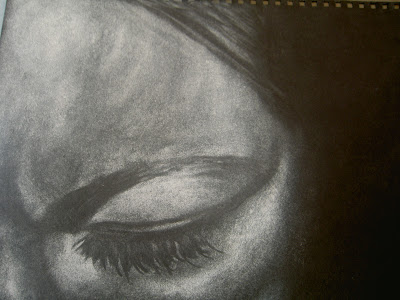When I was in school, I generally had
a frustration in English class. This frustration arose when we would get around
to discussing the themes behind poets poetry, a writers novels or a playwrights
plays. Themes- what were the ideas, the concepts, the issues behind the
creative persons work? One of my English teachers used to sit behind her desk
and rattle off the “themes” of a poets work from a photocopied sheet. I
remember seeing many other things in the poetry, other hidden messages that had
meaning for me. Sometimes I would venture them forward; I would raise my hand
and share my personal insights. Generally, I was told; ‘No, that is not a theme
in this poet’s work.’ So I stopped sharing my thoughts and I learned to feel
stupid for not understanding the art that was before me on the black and white
sheets of paper.
Self-Portrait
I’ve never really come back to poetry; my
teenage spirit became wounded from my perceived lack of comprehension. I always
wanted to shout at the teacher “But how do you KNOW? Were you sitting on the
bench beside him when he wrote the stupid thing?” Of course now I understand
that many people would have studied the poet in-depth and their findings would
have been condensed down for our secondary education text books. I can also see
that maybe my own emotional response to the poem and my exploration of that may
not have gotten me the marks I needed to get an A grad in my Leaving
Certificate. But how sad is that? You may get thousands of
students who can spout off the top ten themes of Shakespeare or Yeats but can
they tell you how the work makes them feel? I still think there are things in
other people’s work that may speak to us and us alone, maybe completely
unintentionally, but speaks to us none the less.
'Container' project. Notebook process work.
The reason I share this story with you is
because I would like to share some of the themes of my work with you. I want to
discuss the reoccurring threads that are woven through my art.
But I don’t want to insinuate for one second
that the themes I see in my work are the only ones. You may see other things;
feel other things about the pictures you see before you. I would encourage you
to trust what you think about the work and your emotional response to it. It
may be you feel happy or sad, intrigued or repulsed, invigorated or subdued.
You might be surmising about the reasons I make the things that I do because
you know me personally or you are making a judgement as a stranger. Some of
your thoughts and feelings may tally with my own accounts but fear not if they do
not match exactly.
'Container' project. 'Don't Judge a Container by it's Cover'. Outside.
I am a huge believer in the un-conscious and
un-conscious actions. You may be right on the money or an aspect of the work
may be mirroring something back to you about yourself. I don’t think an
emotional response can be “wrong”. Learning to trust and listen to my own
guttural reactions to things has been one of the best tools I have learned for
my art and for my life.
'Container' project. 'Don't Judge a Container by it's Cover'. Inside.
Intuition and instinct can be sorely
undervalued so I entreat you to use your own here. The understanding of art and
the reasons for making it does not have to be the domain of educators, students
and scholars alone. Art is not a mythical language that only the few
enlightened ones can grapple with. I am telling you as an artist that I make
things to express my thoughts and feelings and as we all express ourselves
everyday, I completely trust your intelligence and your humanity that you will
understand me.
(Unless, that is, I communicate terribly and
that would be my fault and not yours!)
Self-Portrait.






No comments:
Post a Comment